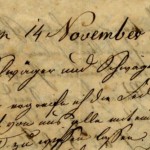A Californian from the age of six, writer Jessamyn West answered to a Hoosier muse. Having left Vernon, Indiana with her family in 1908 to resettle in southern California, West is best remembered for her fictional accounts of pioneer life in Indiana.
The Massacre at Fall Creek takes as its subject the first prosecution of white men in the United States for the murder of Native Americans, based on events that took place in Indiana in 1824.
West made a dazzling literary debut in 1945 with The Friendly Persuasion, a collection of stories about a Quaker family in southeastern Indiana weathering the affronts to their values and lifestyle posed by the Civil War. West’s title makes reference to the Society of Friends, the formal name for the Quaker faith.
The stories emerged from her mother’s recollections of Quaker life in Jennings County, recounted over the author’s extended convalescence from tuberculosis.
“Indiana was terra incognita,” West later recalled, “and my imagination about it had been stirred by my mother’s memories and the words she used to convey those memories. I had no future, so my mother gave me Indiana and her life there.”
Jess Birdwell, the protagonist of The Friendly Persuasion, was modeled after Joshua Milhous, who happened not only to be the author’s great-grandfather but also Richard Nixon’s.
Movie rights to West’s bestselling book were sold in 1946, but the project was tabled when its screenwriter, Michael Wilson, came under suspicion from the House Un-American Activities Committee. The author’s second cousin—then known as Representative Nixon of California’s twelfth district—was a freshman member of that committee.
The film was eventually made in 1956, with a script revamped in part by West herself. William Wyler’s motion picture, starring Gary Cooper and Dorothy McGuire, departed significantly from pacifist themes of the book, but garnered a Palme d’Or at Cannes and a handful of Academy Award nominations. Though his name was left off the film’s credits, the once-blacklisted screenwriter was one of the nominees.
Later in his career President Nixon turned to the film in the hopes that its message—adrift as it was from its Quaker roots—might serve as a justification for his unpopular foreign policy vis-à-vis Cambodia and Vietnam.
Profiling Pat Nixon for Good Housekeeping, Jessamyn West had accompanied the first couple on a trip to Ireland in October 1970. The President had used the reunion as an occasion to reflect, publicly, on their shared Irish-Quaker heritage and his connection to the beloved film.
Back home, Nixon consulted with members of his staff, who contacted network television heads about a nationally coordinated airing of Friendly Persuasion, accompanied by promotional materials emphasizing the President’s personal link to the story.
Due in part to a statement issued by West’s publicist asserting the fictionality of her work, Nixon’s publicity scheme was never launched.
Nonetheless, in his memoirs Nixon spoke fondly of his cousin’s book, and shared boyhood memories of their great-grandmother Elizabeth Price Milhous, upon whom West had based the character of Eliza Birdwell.
Richard Nixon resigned from office in 1974 following the Watergate scandal, to live another twenty years. Jessamyn West passed away in 1984 in Yorba Linda, California, where there is a park named after her.






















